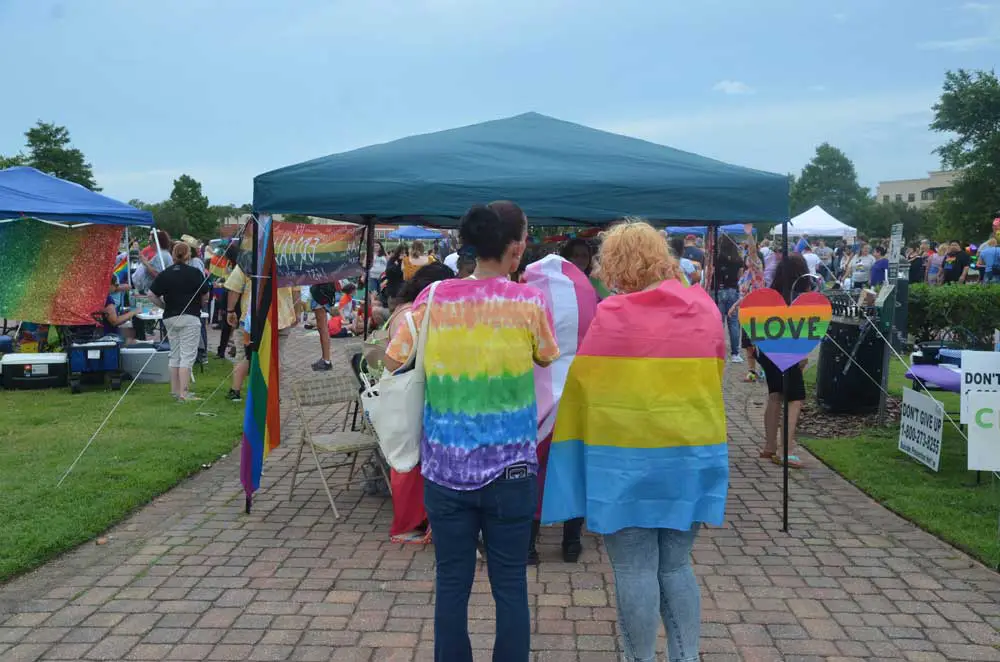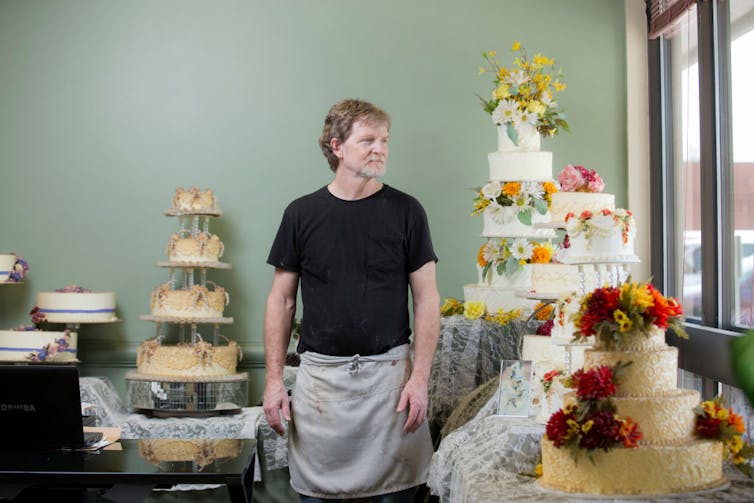
By Charles J. Russo
A simmering, difficult, and timely question returns to the Supreme Court this fall: What happens when freedom of speech and civil rights collide?
The court took up similar questions four years ago in the famous “gay wedding cake” case, Masterpiece Cakeshop, Ltd. v. Colorado Civil Rights Commission, about a baker who refused to provide services for a same-sex couple based on his religious beliefs. The justices ruled in his favor, but did so on narrow grounds, sidestepping the direct constitutional questions over freedom of religion and free speech.
Now, another case from Colorado about free speech and same-sex marriage has made its way to the court: 303 Creative v. Elenis. As a professor of law and education who pays particular attention to First Amendment issues, I see the case highlighting tension between two competing fundamental interests – interests that seem to clash routinely in 21st-century America.
On Aug. 30, 2022, for example, another similar case was decided, this time in Kentucky. A federal trial court ruled in favor of a Louisville wedding photographer who sued over the city’s “Fairness Ordinance,” which prohibits discrimination based on sexual orientation or gender identity. She argued that the law violated her religious beliefs and right to free speech, and the court agreed, explaining that “the government may not force singers or writers or photographers to articulate messages they don’t support.”
Freedom to speak – or stay silent
Graphic artist Lorie Smith is the founder and owner of a studio called 303 Creative. According to court documents, Smith is generally willing to serve LGBTQ clients. However, she intends to begin designing wedding websites and is unwilling to create them for same-sex couples, saying it would go against her Christian beliefs.
Under Colorado’s Anti-Discrimination Act, though, it is discriminatory and illegal to refuse services to someone based on “disability, race, creed, color, sex, sexual orientation, marital status, national origin, or ancestry.”
In 2016, Smith sued the members of the state’s Civil Rights Commission and Colorado’s attorney general. Smith argued that being required to prepare a same-sex wedding website would violate her First Amendment rights by forcing her to speak – what lawyers refer to as “compelled speech.”
The constitutional right to freedom of “speech” has historically been understood to cover a variety of ways people express themselves, including in writing, art and protest. But not only does it protect the right to protect one’s speech, it also safeguards the right to not speak in the first place.
Through her attorneys, Smith also maintained that requiring her to create a website would violate her First Amendment right to the free exercise of religion.
Path to SCOTUS
The federal trial court in Colorado rejected Smith’s request to block the anti-discrimination law in 2019. When she appealed, the circuit court agreed with the previous ruling: She could not refuse to create websites for same-sex weddings, even if it would have gone against her beliefs.
Protecting diverse viewpoints is “a good in and of itself,” the court wrote, but combating discrimination “is, like individual autonomy, ‘essential’ to our democratic ideals.”
In a lengthy dissent, the chief judge highlighted Smith’s claim of compelled speech, criticizing the court for taking “the remarkable – and novel – stance that the government may force Ms. Smith to produce messages that violate her conscience.”
Smith appealed to the Supreme Court, which, in February 2022, agreed to hear her claim, limited to the issue of free speech, not freedom of religion. The question for the nine justices to decide will be “whether applying a public-accommodation law to compel an artist to speak or stay silent violates the Free Speech Clause of the First Amendment.”

Matthew Staver/For The Washington Post via Getty Images
Key to the case?
So, how will the justices rule? The Supreme Court may have given a clue to its initial attitude when it announced it would hear the case. The justices zoomed in on a legal standard called “strict scrutiny,” as they did in its earlier case on this issue, Masterpiece Cakeshop.
Under strict scrutiny analysis, the most stringent form of judicial review, government restrictions on fundamental rights must be justified by a compelling state interest in order to be upheld. In other words, the restrictions must advance government interests of the highest order, and be narrowly tailored to those goals – in this case, preventing discrimination on the basis of sexual orientation.
But the Supreme Court appeared skeptical that Colorado’s anti-discrimination act could survive this test, writing, “The Tenth Circuit applied strict scrutiny and astonishingly concluded that the government may, based on content and viewpoint, force Lorie to convey messages that violate her religious beliefs and restrict her from explaining her faith.”
When the Supreme Court applies strict scrutiny, it rarely upholds governmental restrictions on constitutional rights – which could suggest a win for Smith.
Another possible indication, again in favor of Smith, is in Janus v. American Federation of State, County, and Municipal Employees, Council 31, a 2018 case from Illinois involving compelled speech. Here the Supreme Court ruled in favor of a nonunion public employee who challenged an Illinois law requiring him to pay fair share fees to the union representing his colleagues for costs associated with the bargaining process. The court agreed with the employee’s claim that because the union supported positions with which he disagreed, his having to pay the fees violated his First Amendment right as a form of compelled speech.
A second chance
On the other side of the controversy is the vital interest of same-sex couples and others in the LGBTQ community to live free from discrimination based on their sexual orientations.
In a 2019 case, Bostock v. Clayton County, the Supreme Court interpreted Title VII of the Civil Rights Act of 1964, a far-reaching employment statute, as extending protection against discrimination in the workplace to individuals who are gay and transgender. However, the Court has yet to address the clash of rights at issue in 303 Creative.
The key question, then, appears to be whether individuals can require artists or those who engage in expressive activities to provide their services if doing so can be viewed as a form of compelled speech, violating their right to stay silent on issues with which they disagree.
Thus, it remains to be seen whether 303 Creative will set a new precedent on balancing First Amendment freedoms while protecting others from discrimination. After all, it sidestepped constitutional issues in Masterpiece Cakeshop. The court based its decision in the baker’s favor on some of the Colorado commission members’ comments about his beliefs. The majority found that those comments violated the state’s First Amendment duty to maintain religious neutrality while avoiding hostility to faith-based beliefs or viewpoints.
While the court has not set a date for oral arguments, and likely will not render a judgment until near the end of its term in June 2023, it promises to be one of the upcoming year’s highest-profile judgments. And, regardless of the outcome, 303 Creative is likely to generate even more controversy.
![]()
Charles J. Russo is Joseph Panzer Chair in Education in the School of Education and Health Sciences and Research Professor of Law at the University of Dayton.





























Jimbo99 says
It’s 2008-2012 all over again. Amazing that in a decade to 14 years this hasn’t been laid to rest. It would take less time to bake the cake, take the photos or even build the website and make money off this than to go thru the hell of litigation & waste the resources to debate what anyone’s hobbies are.
Michael Cocchiola says
My guess is the Supreme Court, heavily MAGAified, will rule for discrimination. It is now an American thing.
NAM says
No. It’s a media thing Charles J. Russo here needs to write about something else. Nobody cares so got to stir the pot some how.
Pierre Tristam says
Hardly a “media thing” when the web designer brought suit and has litigated it all the way to the Supreme Court. Is the commenter suggesting that Lorie Smith (the web designer) should have her right to speech (as she sees it) but not Russo? Anything else the commenter would like to thought-police here?
Pogo says
@NAM
You and Russo both need to look under the rock that hides the identities of the creeps paying for all this:
“…ADF is one of the most organized and influential Christian legal interest groups in America…”
https://en.wikipedia.org/wiki/Alliance_Defending_Freedom
Laurel says
Both sides are annoying. First, here are the “Christians” portraying their savior as intolerant, next, there is no reason the couple can’t just go down the street to another company. This is not the same as discrimination in employment or housing. It’s two sides trying to stir it up.
Frank W says
Yes
Deborah Coffey says
The judges never should have ruled in the baker’s favor! Can the wedding website designer deny Muslims service because she likely hates them, too? Does she need to have every woman customer prove to her that they haven’t had an abortion? That would certainly go against her fake Christian faith. What about Catholics? They’ve been called by many Protestant sects, “The whores of Babylon.” The judges had better get it right this time.
Dennis C Rathsam says
Last time I looked all Americans are free. Free to love free to hate free to go to church. You cant make anybody do something they dont believe in. Yoah… This is not China. There are plenty of places to get a cake or buy a dress….Too much drama!
The Geode says
The SAME people saying that a private business should be forced to comply with a customer’s whims are the SAME people that agree with “no shirt, no shoes, no service”. We live in a state where you can quit or be fired “at will” but heaven forbid someone refuses to acquiesce against THEIR best interest concerning THEIR business. I’m sure it’s a lot easier to find someone that provides that service willing to take their money than to make a big fuss over the one that won’t. Then again, it’s all about “making a mess” and becoming a victim in a country that always seems to be searching for the next victim.
Remember the “good ole days” when only HEROES were worshiped?